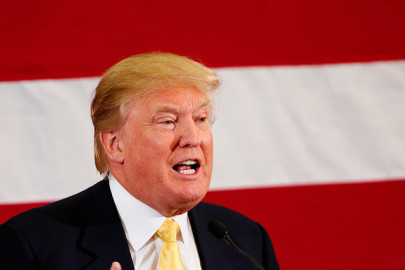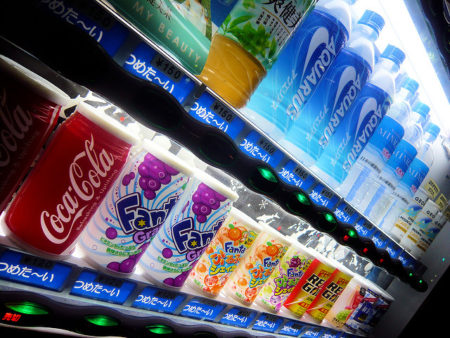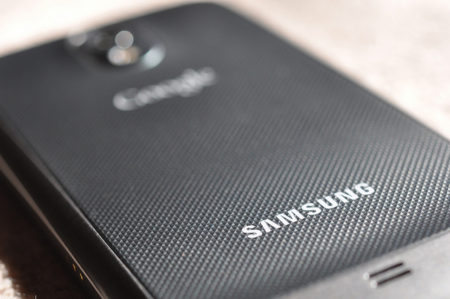By Peter Ward October 14, 2016
Which Candidate Spends Where on Advertising?

Donald Trump ©Michael Vadon
There’s an easy way to figure out where the priorities of a political campaign lie – by checking where it is spending its money. This week Bloomberg published an interactive article tracking the advertising spend of the Trump and Clinton campaigns.
Hillary Clinton is outspending Donald Trump consistently, and during the week of October 4, her campaign lavished $12.9 million on television advertising, compared to around $6 million by Trump. In total, Clinton has spent $144.5 million to date, while Trump has spent $31.7 million.
Digging deeper into the data, Bloomberg shows where exactly that money has been spent.
In Colorado, Clinton has spent nothing on TV advertising in the last week, while Trump has spent over $40,000. Trump has also outspent Clinton in New Hampshire, $149,000 to $92,000. But in every other state with any television advertising spend, Clinton has spent more.
In the next three weeks ahead of the election, Trump plans to increase his spending significantly, while Clinton will spend only around $8 million more. Nearly a third of Trump’s advertising spend between now and November will be directed at Florida. But in cost-per-electoral vote terms (given that some states are worth more electoral votes than others) his main focus seems to be New Hampshire. Using the same measure, Clinton’s top priorities are Nevada and Florida.
Beverage Industry Donations Under Scrutiny

-Soda machine. ©S.
Coca-Cola and Pepsi have given millions of dollars to health groups in recent years, while spending similar amounts to lobby against restrictions on America’s soda intake, the New York Times reported this week.
A study published on Monday in the American Journal of Preventive Medicine looks into the beverage industry’s links to the health community over the past five years. The researchers found that the companies were spending millions to defeat legislation on soda.
The report also found that in a number of instances, health groups accepted donations from the beverage industry and then backed away from soda taxes or remained silent about initiatives to reduce the amount of soda Americans drink.
“We wanted to look at what these companies really stand for,” Daniel Aaron, the study’s co-author told the Times. “And it looks like they are not helping public health at all — in fact they’re opposing it almost across the board, which calls these sponsorships into question.”
When New York proposed banning extra-large sodas in 2012, the Academy of Nutrition and Dietetics didn’t support the effort, citing “conflicting research.” The same organization accepted $525,000 in donations from Coca-Cola that year, and received $350,000 the year after.
Obama’s Airline Industry Fail
American Airlines merger with US Airways went through despite initial opposition from the Obama administration. ©Patrick Cardinal
Has the Obama administration failed to protect consumers against rising airline prices? That’s the question posed by ProPublica in a long read published on Tuesday.
Three years ago, the U.S. government filed a suit to block a merger between American Airlines and US Airways, claiming that these types of mergers were forcing passengers to pay more to travel. “Increasing consolidation among large airlines has hurt passengers,” the lawsuit said. “The major airlines have copied each other in raising fares, imposing new fees on travelers, reducing or eliminating service on a number of city pairs, and downgrading amenities.”
But three months later the U.S. government backed down, and an industry that was once dominated by eight major players shrank down to just four. During Obama’s time as U.S. president, his administration has approved three major airline mergers, giving those remaining four companies control of more than 80% of the market.
Since the American Airlines deal went through, prices at the airline have steadily increased. Main Cabin Extra seats cost passengers between $8 and $159 in 2013, but now cost an extra $20 to $280.
Earlier this year American Airlines also got rid of a discount fare program, but then brought it back only for selected routes. Both the price increases and the rollback of the discount program were predicted by the U.S. government in the original suit against the merger.
Samsung Suffers Fallout from Galaxy Note 7

Samsung phone. ©opopododo, flickr
Samsung will reportedly lose $1.9 billion in profits as it scraps its Galaxy Note 7 handset following safety concerns.
The company was forced to stop selling the Galaxy Note 7 model completely on Tuesday, after multiple reports of the phones catching fire and exploding due to overheating batteries. Samsung will give owners of the phone $25 in credit if they claim a full refund and $100 if they exchange it for any other Samsung device.
The phone was launched in August and reports soon began to appear of property devices and burns. A man in Florida posted photos online of his jeep on fire after leaving his Galaxy Note 7 on charge in the vehicle.
In early September the firm said it would replace all of the 2.5 million phones already sold, but was eventually forced to scrap the model altogether after the replacements also caught fire. Samsung has lost $14 billion from its market value because of the incidents.
“This has been a case study in how not to do a recall,” Mark Johnson, associate professor of operations management at Warwick Business School told The Guardian. “It was only when the second batch of phones began to fail that they began to show that there were more serious issues at play. Shareholders rightly get twitchy when firms are seen not to care about customers.”
The Week’s Top Headlines
Wells Fargo CEO John Stumpf is out – Matt Egan, Jackie Wattles and Cristina Alesci, CNN Money
Amazon launches Spotify and Apple Music competitor – Alex Hern, The Guardian
China tops US in numbers of billionaires – BBC
Germany’s top court allows CETA trade deal to go ahead – DW
Delta earnings drop in 3Q with $150M loss from technology outage – Bart Jansen, USA Today
New York just made the case that two former Uber drivers should be treated as employees – Alison Griswold, Quartz
Deutsche Bank Said to Implement Hiring Freeze as CEO Cuts Costs – Aaron Kirchfeld, Jan-Henrik Foerster, Bloomberg News
Major mall operator to close 73 shopping centers on Thanksgiving – Krystina Gustafson, CNBC
Goldman’s Online Consumer-Lending Platform Goes Live – Telis Demos, Liz Hoffman, Wall Street Journal
U.S. jobless claims at 43-year low; import price deflation easing – Lucia Mutikani, Reuters
This entry was posted on Friday, October 14th, 2016 at 8:00 am. It is filed under Week in Review. You can follow any responses to this entry through the RSS 2.0 feed.
Comments are closed.
